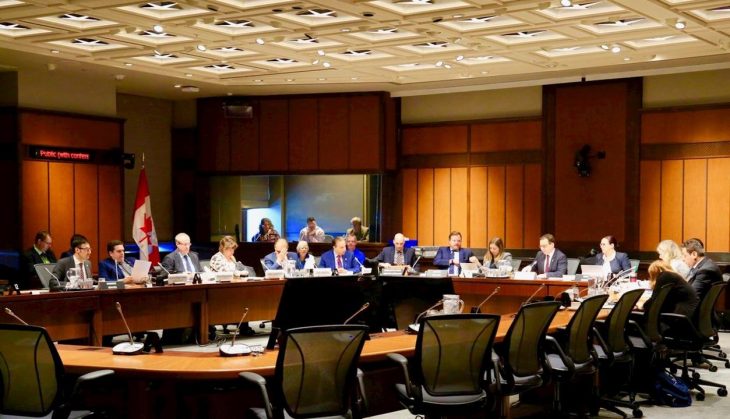
OTTAWA – Rogers’s proposed purchase of Shaw faces just one more hurdle: the innovation minister’s approval of the transfer of Freedom spectrum assets to Videotron, which agreed to purchase the company for nearly $3 billion.
The deal’s prospects improved dramatically when it survived a Competition Bureau challenge at the Federal Court of Appeal, which denied yesterday a request to find in error the Competition Tribunal’s approval of the deal. Even more so when the bureau announced late last evening that it will not appeal the court’s decision.
But now scrutiny will be leveled against it once more as it heads to the House of Commons industry committee, which will hold today perhaps the last hearing for a deal nearly two years in the making and that is scheduled to close on January 31.
Cartt asked participants for a preview of their arguments to get readers prepped for a possible last showdown that will feature guests including officials from the merging parties, Innovation Canada and the Competition Bureau. The latter two said they could not provide notes ahead of the hearing.
The merging parties
The heads of both Rogers and Shaw are expected to argue the deal’s competitive benefits, including the disruptive force that Videotron will be as a fourth national carrier in certain markets. Rogers will try to convince the committee that the combined entity will be a stronger competitor against Telus than Shaw in the western provinces and Videotron will be a stronger competitor than Freedom and Shaw Mobile in the absence of a merger.
Rogers has also suggested that the deal’s competitive benefits can be seen simply by the way its competitors reacted. Evidence from the month-long hearing in front of the Competition Tribunal revealed Telus’s strategy to “kill, slow and shape” the deal.
Compass Lexecon
Economic consultancy firm Compass Lexecon, based out of Washington D.C., will support the merging parties’ proposal. The firm, which will be represented by Bryan Keating, was hired by Rogers in the spring of 2021 to provide information and analysis to the Competition Bureau, including four reports and other submissions during its review of the proposed deal.
Keating will argue that the deal will improve wireless competition in Canada because it will maintain a fourth player in key markets, give Videotron a needed accelerant in Freedom to roll out its 5G plan, and will bolster Rogers as a competitor in more locales against Telus and Bell.
He will also argue that it will increase wireline competition for reasons including the economies of scale will allow Rogers to be a more efficient and aggressive competitor and Rogers’s stronger bundling ability than Shaw means a better competitor in western markets. There will also be more bundled options for consumers as a result.
TekSavvy
The largest independent telecommunications company will argue that there would have been no way regulators would have thought it acceptable if Rogers offered Videotron wholesale access to its network at the current regulated rates, so it promises to undercut those rates to give Videotron a chance in the market.
This, TekSavvy has put to the CRTC, is against the Telecommunications Act’s undue preference and unjust discrimination provisions. The company has already asked the innovation minister to block the deal on the grounds that the side deal is illegal. It is asking the CRTC to either force Rogers to cancel its commitment to Videotron on the side offer, or provide that same deal to all competitors.
But the company’s broader point is that the current wholesale regime is not working. In 2021, the CRTC nixed its lower proposed lower 2019 rates because of mistakes in the methodology, defaulting to the higher 2016 rates.
Both previous and current CRTC heads acknowledged the system is not working as intended, and that work is being done to improve the outlook.
Individuals
Ben Klass, a PhD candidate at Carleton University’s School of Journalism and Communication and board member of the Canadian chapter of the Internet Society, will argue the Rogers-Shaw merger is anticompetitive and should not be allowed.
The approval of the deal by the CRTC and the Competition Tribunal shows that reform of competition and telecommunications legislation is needed, he wills say, adding it’s not too late for the minister to block the deal.
Keldon Bester, co-founder of the Canadian Anti-Monopoly Project (CAMP), will argue that if Canada’s competition laws are not reformed, there will be even bolder proposed mergers coming soon. This is a problem for competitive markets, the organization will argue.
Other individuals including University of Ottawa law professor Jennifer Quaid and Edward Iacobucci, professor and Toronto Stock Exchange Chair in Capital Markets, Faculty of Law at the University of Toronto.
Others
Although Globalive has not shared what its position will be, it is a funder of CAMP. Globalive announced yesterday that it has bid for the wireless spectrum of Xplore Mobile, which shuttered this past summer. The investment firm has been pitching itself as a better suitor for Freedom Mobile than Videotron.
Pierre Karl Peladeau, president and CEO of Quebecor — which did not share the president’s remarks — pitched what Videotron promises to do for Canadians if it gets the Freedom assets.


